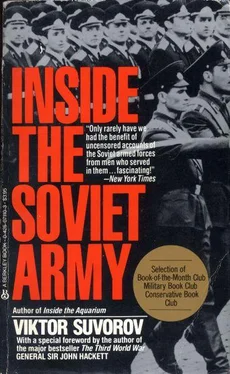Being unopposed, this theory was to be found in the pages of both serious studies and light novels-the latter being fantasies with happy endings, in which a nuclear war was brought to a halt in such a way that it could never recur.
The theory that a nuclear war would take a long time to build up originated in the West at the beginning of the nuclear age. It is incomprehensible and absurd, and it completely mystifies Soviet marshals. For a long time there was a secret debate at the highest levels of the Soviet government-have the Western politicians and generals gone off their heads or are they bluffing? It was concluded that, of course, no one really believed in the theory but that it had been thought up in order to hide what Western policy-makers really believed about the subject. But then the question arose: for whose benefit could such an unconvincing and, to put it mildly, such a silly idea have been dreamed up? Presumably not for that of the Soviet leadership. The theory is too naive for specialists to believe. That must mean that it was devised for the ignorant and for the popular masses in the West, to reassure the man in the street.
2
The first American film I ever saw was The Magnificent Seven with Yul Brynner in the main role. At that time all I knew about the Americans was what Communist propaganda said about them and I had not believed that since my earliest childhood. Thus it was from a cowboy film that I began to try to form my own independent opinions about the American people and about the principles by which they live.
American films are not often shown in the Soviet Union, but after The Magnificent Seven I did not miss a single one. The country as I saw it on the screen pleased me and the people even more so-good-looking, strong, masculine and decisive. It seemed that the Americans spent all their time in the saddle, riding on marvellous horses in blazing sunlight through deserts, shooting down villains without mercy. My heart belonged only to America. I worshipped the Americans-in particular for the decisiveness with which they kept down the number of crooks in their society. The heroes of American films would submit for long periods and with great patience to humiliation and insults and were cheated at every turn, but matters were always settled with a dramatically decisive gunfight. The two enemies gaze unflinchingly into each other's eyes. Each has his hands tensely over his holsters. No exchange of curses, no insults, not a superfluous movement. Dramatic silence. Both are calm and collected. Clearly death has spread its black wings above them. The gunfight itself almost represents death, for each of them. They look long and hard into each other's eyes. Suddenly and simultaneously both of them realise, not from what they see or hear, not with their minds or their hearts but from pure animal instinct, that the moment has come. Two shots ring out as one. It is impossible to detect the moment at which they draw their guns and pull the triggers. The denouement is instantaneous, without preamble. A corpse rolls on the ground. Occasionally there are two corpses. Usually the villain is killed but the hero is only wounded. In the hand.
Many years passed and I became an officer serving with the General Staff. Suddenly, as I studied American theories of war, I came to an appalling realisation. It became clear to me that a modern American cowboy who is working up to a decisive fight will always expect to begin by spitting at and insulting his opponent and to continue by throwing whisky in his face and chucking custard pies at him before resorting to more serious weapons. He expects to hurl chairs and bottles at his enemy and to try to stick a fork or a tableknife into his behind and then to fight with his fists and only after all this to fight it out with his gun.
This is a very dangerous philosophy. You are going to end up by using pistols. Why not start with them? Why should the bandit you are fighting wait for you to remember your gun? He may shoot you before you do, just as you are going to slap his face. By using his most deadly weapon at the beginning of the fight, your enemy saves his strength. Why should he waste it throwing chairs at you? Moreover, this will enable him to save his own despicable life. After all, he does not know, either, when you, the noble hero, will decide to use your gun. Why should he wait for this moment? You might make a sudden decision to shoot him immediately after throwing custard pies at him, without waiting for the exchange of chairs. Of course he won't wait for you when it comes to staying alive. He will shoot first. At the very start of the fight.
I consoled myself for a long time with the hope that the theory of escalation in a nuclear war had been dreamed up by the American specialists to reassure nervous old-age pensioners. Clearly, the theory is too fatally dangerous to serve as a basis for secret military planning. Yet, suddenly, the American specialists demonstrated to the whole world that they really believed that this theory would apply to a world-wide nuclear war. They really did believe that the bandit they would be fighting would give them time to throw custard pies and chairs at him before he made use of his most deadly weapon.
The demonstration was as public as it possibly could be. At the end of the 1960s the Americans began to deploy their anti-missile defence system. They could not, of course, use it to defend more than one vitally important objective. The objective they chose to protect was their strategic rockets. They did not decide to safeguard the heart and mind of their country-the President, their government or their capital. Instead they would protect their pistol-in other words they were showing the whole world that, in the event of a fight, they did not intend to use it. This revelation was greeted with the greatest delight in the Kremlin and by the General Staff.
3
The philosophy of the Soviet General Staff is no different from that of the horsemen whom I had watched riding the desert. `If you want to stay alive, kill your enemy. The quicker you finish him off, the less chance he will have to use his own gun. In essence, this is the whole theoretical basis on which their plans for a third world war have been drawn up. The theory is known unofficially in the General Staff as the `axe theory'. It is stupid, say the Soviet generals, to start a fist-fight if your opponent may use a knife. It is just as stupid to attack him with a knife if he may use an axe. The more terrible the weapon which your opponent may use, the more decisively you must attack him, and the more quickly you must finish him off. Any delay or hesitation in doing this will just give him a fresh opportunity to use his axe on you. To put it briefly, you can only prevent your enemy from using his axe if you use your own first.
The `axe theory' was put forward in all Soviet manuals and handbooks to be read at regimental level and higher. In each of these one of the main sections was headed `Evading the blow'. These handbooks advocated, most insistently, the delivery of a massive pre-emptive attack on the enemy, as the best method of self-protection. This recommendation was not confined to secret manuals-non-confidential military publications carried it as well.
But this was trivial by comparison to the demonstration which the Soviet Union gave the whole world at the beginning of the 1970s, with the official publication of data about the Soviet anti-missile defence system. This whole system was, in reality, totally inadequate, but the idea behind it provides an excellent illustration of the Soviet philosophy on nuclear war. By contrast to the United States, the Soviet Union had no thought of protecting its strategic rockets with an anti-missile system. The best protection for rockets in a war is to use them immediately. Could any one devise a more effective way of defending them?
Читать дальше












